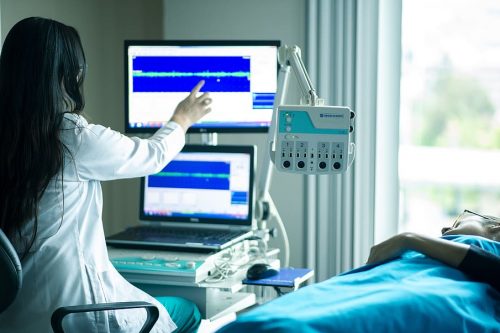University teams up with NHS to launch health technology centre

A centre to support the development of health technology has been launched by University of Leeds in partnership with Leeds Teaching Hospitals NHS Trust.
It is one of three initiatives announced to support novel ideas from the point of discovery to where they are transformed into new products and devices to treat patients – or to prevent ill health among the public.
They are a Healthtech Catalyst, linking industry, researchers, public sector, investors and entrepreneurs; an Innovation Pop Up at Leeds General Infirmary to accelerate the introduction of health technologies in a hospital setting; and the Leeds Centre for HealthTech Innovation, the joint initiative between Leeds Teaching Hospitals NHS Trust (LTHT) and the university.
Leeds City Region is already home to more than a fifth of the UK’s digital health jobs and hundreds of digital and health technology businesses. The aim is to elevate the region to a global centre for health research and health technology innovation.
The new centre will build on the university’s research strengths in health technologies which include cell and tissue regeneration; robotics and devices to assist surgeons and patients; smart materials and nanotechnology; advanced imaging and artificial intelligence systems.
David Jayne, professor of surgery at the University of Leeds, consultant colorectal surgeon at LTHT and co-director of the new centre, said: “Our aim is to try and avoid some of the obstacles that get in the way of good ideas ever reaching the patient or wider public.
“Part of the problem is the time it takes to develop new technologies – on occasions, it is far too slow.
“Some good ideas fail to make it because they fall by the wayside, not because the idea is inherently bad but because the system of development, testing, evaluation and eventually adoption by clinicians can be complex and convoluted.
“What we will be doing is wrapping our arms around these projects and doing our level best to get them through the innovation pipeline.
“Because this centre is a partnership between the University and the NHS, we can provide support at all critical stages of a project.”
The centre will draw on more than 300 clinical scientists and academics from across the university and LTHT. It will also work as part of a wider network of experts from industry, higher education and healthcare who can be involved in collaborative projects and multidisciplinary research.
Jayne said the technology developed will be both sustainable and affordable and will focus on four key themes: technology that speeds up and improves diagnosis; new treatments that have fewer side-effects and improve quality of life; new therapies tailored to specific patient groups; and the development of smart health through the use of apps and wearable devices.
Professor Alex Franji, from the School of Computing at Leeds and a pioneer of virtual or in-silica clinical trials, is the other centre co-director.
He said: “By bringing the strengths of the university, industry and the NHS together, the Leeds Centre for HealthTech Innovation can play a key role in transforming Leeds into one of the most connected and successful cities in the world for health research and innovation.”
Dr Phil Wood, chief medical officer at LTHT, added: “The Centre for HealthTech Innovation fulfils a vital gap in our healthcare innovation ecosystem, bridging our two institutions to create exciting new interdisciplinary teams with a value-based approach, to address big healthcare challenges, enhance current treatment approaches and use the opportunities of novel technologies to provide benefits for patients.”








